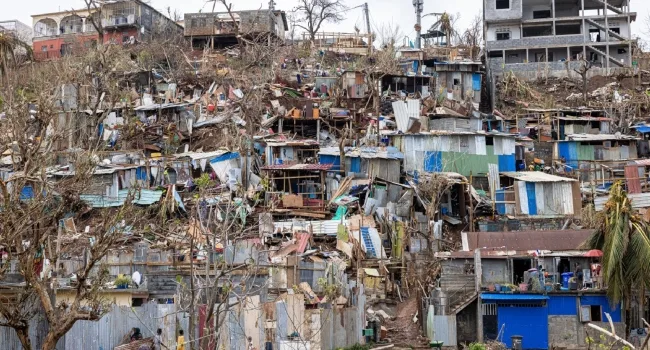Cyclone Chido has killed at least 94 people in Mozambique, the country’s disaster management agency confirmed on Sunday, revising an earlier death toll of 76.
The powerful storm wreaked havoc across the Indian Ocean, first devastating the French island territory of Mayotte before making landfall on the African mainland.
In Mozambique, the cyclone destroyed over 110,000 homes, further compounding the nation’s challenges. The storm strikes as Mozambique grapples with the fallout from a deadly post-election crisis, where the ruling party, Frelimo, faces accusations of electoral fraud from the opposition.
After striking Mayotte, Chido made landfall in northern Mozambique, particularly affecting the province of Cabo Delgado. With wind gusts reaching up to 260 kilometers (160 miles) per hour and over 250 millimeters (10 inches) of rain falling in just one day, the region bore the brunt of the storm. Cabo Delgado, already suffering from a long-running Islamist insurgency, has seen its hardships worsened by the cyclone.
More than 500,000 of the estimated 620,000 Mozambicans affected by the storm are in Cabo Delgado, according to officials. In the Mecufi district, one of the hardest-hit areas, a mosque was left roofless by the fierce winds, as captured in images shared by UNICEF.
The cyclone’s destruction is exacerbated by Mozambique’s ongoing political instability. The ruling Frelimo party’s presidential candidate, Daniel Chapo, whose victory in the controversial October elections has been disputed by the opposition, visited the affected areas on Sunday.
Protests against Chapo’s win, which opposition groups claim was fraudulent, have already claimed at least 130 lives, according to local civil society group Plataforma Decide, whose figures were cited by Amnesty International.
Chapo, who is set to be sworn in as president on January 15, provided a televised appeal for citizens to donate food and clothing to those affected by the disaster. “Even if we are using them, our brothers need them,” he said.
The political unrest continues to disrupt the country. The protests have led to widespread shutdowns in city centers, with several power plants closed. Police have been accused of using live ammunition to quell demonstrations.
Opposition leader Venancio Mondlane has warned of “chaos” if the Constitutional Council affirms the election results, which placed him second in the October 9 polls.
As of now, Mozambique remains the hardest-hit country from Cyclone Chido. In Mayotte, seven days after the cyclone struck, the death toll stood at 35, with around 2,500 injured, according to the French Interior Ministry. However, the toll is expected to rise, particularly among undocumented migrants from nearby Comoros, many of whom live in the shantytowns that were flattened by the storm.
The Comoros, which also claims sovereignty over Mayotte, declared a national day of mourning despite not reporting any deaths on its territory.
After devastating Mozambique, Cyclone Chido moved on to Malawi, where it caused additional casualties. Although weakened, the storm killed 13 people and injured nearly 30, according to the Malawian disaster management agency.
The cyclone struck as Malawi and Mozambique were already dealing with one of the worst droughts to hit southern Africa in a century, according to the United Nations.
AFP


